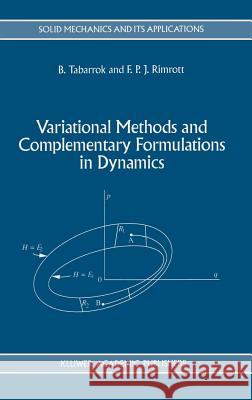Variational Methods and Complementary Formulations in Dynamics » książka
Variational Methods and Complementary Formulations in Dynamics
ISBN-13: 9780792329237 / Angielski / Twarda / 1994 / 368 str.
Not many disciplines can c1aim the richness of creative ideas that make up the subject of analytical mechanics. This is not surprising since the beginnings of analyti- cal mechanics mark also the beginnings of the theoretical treatment of other physical sciences, and contributors to analytical mechanics have been many, inc1uding the most brilliant mathematicians and theoreticians in the history of mankind. As the foundation for theoretical physics and the associated branches of the engineering sciences, an adequate command of analytical mechanics is an essential tool for any engineer, physicist, and mathematician active in dynamics. A fascinating dis- cipline, analytical mechanics is not only indispensable for the solution of certain mechanics problems but also contributes so effectively towards a fundamental under- standing of the subject of mechanics and its applications. In analytical mechanics the fundamental laws are expressed in terms of work done and energy exchanged. The extensive use of mathematics is a consequence of the fact that in analytical mechanics problems can be expressed by variational State- ments, thus giving rise to the employment of variational methods. Further it can be shown that the independent variables may be either displacements or impulses, thus providing in principle the possibility of two complementary formulations, i.e. a dis- placement formulation and an impulse formulation, for each problem. This duality is an important characteristic of mechanics problems and is given special emphasis in the present book.











